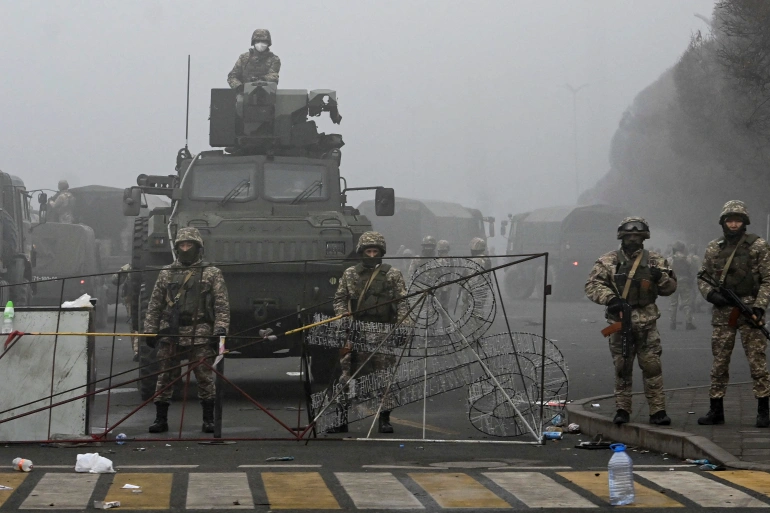Street battles resume in the country’s largest city, Almaty, as Russia sends in paratroopers to quell countrywide uprising.
Fresh violence erupted in Kazakhstan’s largest city on Thursday as Russia rushed in paratroopers to put down a countrywide uprising in one of Moscow’s closest former Soviet allies.
Police in the main city Almaty said they had killed dozens of protesters. The authorities said at least 18 members of the security forces had died, including two found decapitated. More than 2,000 people had been arrested.
Burned-out vehicles littered Almaty’s streets, several government buildings were in ruins and bullet casings were strewn over the grounds of the presidential residence, which was stormed and looted by protesters on Wednesday.
“I didn’t know our people could be so terrifying,” Samal, a 29-year-old nursery-school teacher, told the news agency AFP near the residence.
Military personnel regained control of the main airport, seized earlier by protesters. Thursday evening saw renewed battles in Almaty’s main square, occupied alternately by troops and hundreds of protesters throughout much of the day.
The Russian deployment was a gamble by the Kremlin that rapid military force could secure its interests in the oil and uranium-producing Central Asian nation, by swiftly putting down the worst violence in Kazakhstan’s 30 years of independence.
Reuters journalists reported hearing explosions and gunfire as military vehicles and dozens of soldiers advanced in Almaty, although the shooting stopped again after nightfall.
Local media reports said security forces had cleared demonstrators from the central square and other key government buildings, but there were also reports of gunfire elsewhere in the city.
The internet was shut down across the country, making it impossible to gauge the extent of the unrest. But the violence was unprecedented in a state ruled firmly since Soviet times by leader Nursultan Nazarbayev, who held on to the reins despite stepping down three years ago as president.
‘Counter-terrorist operation’
Nazarbayev’s hand-picked successor, President Kassym-Jomart Tokayev called in the Russian forces overnight as part of a Moscow-led military alliance of ex-Soviet states, to combat what he called foreign-trained “terrorist groups”.
Moscow said it would consult with Kazakhstan and allies on steps to support the Kazakh “counter-terrorist operation” and repeated Tokayev’s assertion that the uprising was foreign-inspired. Neither Kazakhstan nor Russia provided evidence to support the claim.
Moscow did not disclose how many troops it was sending or what role they were playing, and it was not possible to determine the extent to which Russians may have been involved in Thursday’s unrest.
The uprising, which began as protests against a New Year’s Day fuel price increase, swelled on Wednesday, when protesters, chanting slogans against Nazarbayev, stormed and torched public buildings in Almaty and other cities.
Tokayev initially responded by dismissing his cabinet, reversing the fuel price rise and distancing himself from his predecessor, including by taking over a powerful security post Nazarbayev had retained.
But those moves failed to mollify crowds who accuse Nazarbayev’s family and allies of amassing vast wealth while the nation of 19 million remained poor.
Nazarbayev stepped aside from the presidency in 2019 as the last Soviet-era Communist Party boss still ruling a former Soviet state. But he and his family kept posts overseeing security forces and the political apparatus in Nur-Sultan, the purpose-built capital bearing his name. He has not been seen or heard from since the unrest began.
Many protesters shouted “Old Man, Out!” in reference to Nazarbayev and several witnesses confirmed to AFP that a statue of the ex-leader had been torn down in the southern city of Taldykorgan.
‘Looters came in’
The swift arrival of Russian troops demonstrated the Kremlin’s willingness to safeguard its influence in the ex-Soviet Union with force.
Since late 2020, Moscow has shored up the leader of Belarus against a popular uprising, intervened to halt a war between Azerbaijan and Armenia, and, to the West’s alarm, massed troops again near Ukraine, which Russia invaded eight years ago.
Deployment in Kazakhstan carries risk: by exposing the Kazakh authorities as dependent on Russian muscle, Moscow could further inflame the protesters.
It is difficult to say how broad support might be for protests in a country with little organised opposition, especially if demonstrators are blamed for violence.
“Thank God, the military has arrived, finally,” Ali, a manager at Holiday Inn hotel near Almaty’s main square, told Reuters by phone. “Looters came in last night, smashing car windows near us.”
The West has so far mainly limited its response to calls for calm. US Secretary of State Antony Blinken spoke to his Kazakh counterpart “and advocated for a peaceful, rights-respecting resolution to the crisis”, spokesperson Ned Price said on Thursday.
EU top diplomat Josep Borrell said on Thursday Russia’s military intervention brought “memories of situations to be avoided”.

Source:ALJazeera /News Agencies

